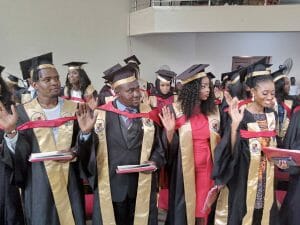The Medical Laboratory Science Council of Nigeria (MLSCN) inducted 33 qualified Igbinedion University, Okada graduates into the profession on Monday.
Tosan Erhabor, the Registrar of the Council, charged the inductees during the oath taking to always adhere to the ethics of the profession.
According to the registrar, the oath conferred certain responsibilities on them in terms of improving healthcare delivery services to citizens.
“In the profession, there are ethics to guide you. “Because you are not being coerced into this, it is not too late to opt out now if you are not prepared to work in accordance with the ethics,” he said.
Erhabor emphasized the importance of diagnosis in medical decisions, stating that medical laboratory scientists must be efficient in order to improve service delivery.
The MLSCN president praised the university for providing medical laboratory science education.
According to him, the achievement earned the school five-year full accreditation from the council based on the report of the accreditation panel that recently visited the institution.
“I want to commend the management for upholding the vision of the institution’s founder, particularly in terms of high academic quality.”
“The council is eager to collaborate with such an institution to help improve health-care services in the country.”
Prof. James Damen, President of the Association of Medical Laboratory Scientists of Nigeria (AMLSN), stated during his induction that 70% of medical decisions are based on laboratory results.
Damen lamented, in a lecture titled “Implications of Misdiagnosis on Patients: Lessons for Medical Laboratory Scientists,” that one of the departments in hospitals facing a slew of challenges remained the medical laboratory.
He blamed misdiagnosis on a leadership crisis among professionals in the department, such as pathologists and medical laboratory scientists.
Other causes he identified included unethical practice, inadequate medical laboratory facilities, a weakened health-care system, brain drain, a lack of a conducive working environment, and quackery, among others.
Earlier in his speech, Prof. Lawrence Ezemonye, the institution’s Vice-Chancellor, expressed his delight that the school had been awarded five-year full accreditation for producing quality healthcare practitioners in the country.
According to Ezemonye, the university prioritized capacity and human capital training in health-related disciplines in order to advance the cause of healthcare delivery in Nigeria.
The vice-chancellor outlined the institution’s accomplishments in revitalizing the country’s education sector.
He announced that the school would soon begin a series of Graduates Job Expo conversations for the benefit of students.
This, he claims, is intended to expose students to career opportunities in national and multinational industries, beginning with the aviation sector.
